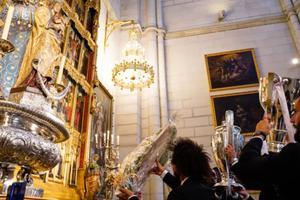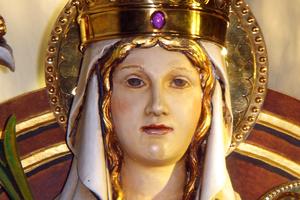England Soccer Fans Know How This One Ends
But They’re Quietly Hoping This Sort of History Doesn’t Repeat Itself

When England’s quarterfinal against Switzerland went to what English newspapers like to call “cruel penalties,” Joseph Pearce left the bar in South Carolina where he was watching the game.
The East London native and lifelong England fan had already paid the bill, so he could exit right at the whistle, without having to watch the rest.
“When I got home, I phoned someone and said, ‘Did we lose?’” said Pearce, a prolific Catholic author, editor, and lecturer.
The shocking answer: No, England won. And after beating Holland in the semi-final Wednesday, the team is now in the 2024 European Championship tournament final, against favored Spain, on Sunday, seeking its first ever Euros victory.
Pearce isn’t alone in his skepticism about his beloved national team. England’s laughably poor record at penalty kicks – losing its first seven penalty shootouts in major tournament elimination games – is legendary.
“Until very recently, whenever there was a penalty shootout I would go out of the room, because I just couldn’t watch us lose on penalties again,” said Trevor Lipscombe, London native, Charlton Athletic fan, and director of The Catholic University Press of America.
Oh No, Not Again
Both men describe a lifetime of disappointment. England, which invented soccer and has the richest professional soccer league in the world, has won exactly one major tournament – the 1966 World Cup, which at 58 years young is beyond the memory of most of the team’s current followers. Along the way the team has been known for spectacular underachievement.
Pearce, now 63, was 9 when it all started going wrong, during the 1970 World Cup. England had a 2-0 lead in the second half of a quarterfinal against West Germany, when his favorite player from his beloved Chelsea, goalkeeper Peter Bonetti, gave up a soft goal that began the German comeback.
For Lipscombe, 62, the memory of that game (in particular) and many others won’t be erased if England wins Euro 2024 this weekend.
“I’m at an age when it can’t make up for the past. I’m still bristling over 1970 against West Germany, when I was a little kid, when we were up 2-0, we put the subs in too early and lost 3-2,” Lipscombe said.Then there was the time San Marino scored a goal 9 seconds into the game, and the time England lost a knockout game to little Iceland, and the times England failed to make the World Cup, and the time …
Still, England made the Euro final in 2021, losing to Italy. So are the English ascending?
Once Upon a Time
The Register asked several Catholic fans of England to talk about their experiences with the team, both during the current tournament and the years leading up to it.
What’s the Catholic angle?
Indirect, at most. Unlike in Northern Ireland and Scotland, soccer in England isn’t noticeably sectarian these days.
On paper, England (which does not include its United Kingdom neighbors Scotland, Wales, and Northern Ireland, each of which has its own national team) appears to be one of the least Catholic countries in the tournament. Less than 10% of the country is Catholic, and Mass attendance is at or under 25%.
Yet it has a rich, if hidden, Catholic tradition. Peter Ackroyd in his 1998 biography of St. Thomas More called pre-Reformation England the most Catholic country in Europe – a claim Pearce, author of a 2022 Catholic history of the country called Faith of Our Fathers: A History of True England, said is demonstrably true.
“We have a noble history as Catholics in England, but most people don’t know that,” Pearce said.
Lipscombe told the Register he has frequently prayed to Our Lady of Walsingham during penalty shootouts – and lately, England has been doing better at them, winning three of the last four.
Is The Gloom Off the Rose?
All the men of Robert Asch’s Catholic parish in Preston, England are watching the 2024 Euros, he said.
Asch, 55, a convert to Catholicism from Reform Judaism, recounted the history of soccer in England in great detail for the Register.
He and other England fans admit to a certain negative outlook on life – both toward their national team and more generally.
Asch allowed that the general English demeanor is “maybe gently pessimistic,” which includes what he called “a kind of chronic insecurity” about the England team.
“The sensibility of Englishmen is tending toward things that aren’t likely to be fantastic,” Asch said.
Some trace the mood to the weather, the loss of the British Empire, or uncertainty about the economy and culture.
“I think there’s a lot of disillusion about the way that the country has gone since World War II, and I think there’s a pessimism and cynicism that’s part of the English psyche that’s not too attractive, truth for to be told,” Pearce said. “I think that’s one reason the English are so desperate to win something in sport, especially in football.”
So, what would a victory on Sunday mean?
It can only be imagined, at this point.
“England winning this year would mean a lot to their fans and to everyone who loves English football like me,” said Christian Cristobal, communications coordinator of the Archdiocese of Portland in Oregon, by email.
“We’ve done our time in Purgatory, and hopefully on Sunday we will enter the soccer equivalent of the beatific vision,” Lipscombe said.
“No matter what happens on Sunday, it’s been a real tonic to get to the final,” Asch said.
Even so, he said, the English team’s grim past isn’t forgotten.
“I would pose that the shadow hasn’t lifted, to be honest,” he said. “But it’s lift-ing.”

















